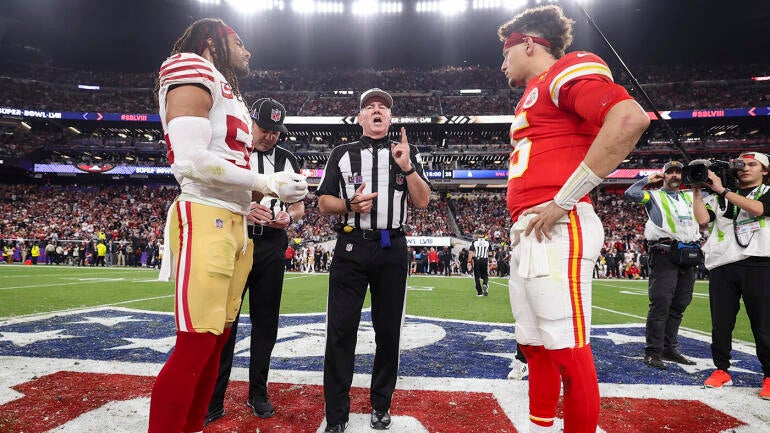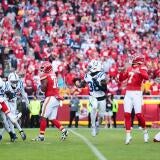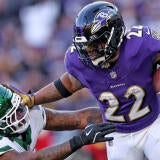New NFL overtime rules coming to regular season: How will teams handle them? How should they?
The extra period will look very different from years past, and strategy matters way more than ever

Welcome to "NFL Thoughts," a wide-ranging, in-depth look at some of the top storylines of the 2025 season. This one's simple: How should NFL teams handle the new overtime rules, approved this spring, and how will they actually handle them?
In the bowels of Allegiant Stadium, moments after a devastating 25-22 overtime Super Bowl LVII loss to the Chiefs, 49ers defensive lineman Arik Armstead and fullback Kyle Juszczyk had perhaps the most damning comments of all: They didn't know the new playoff overtime rules.
"I didn't even know about the new playoff overtime rule, so it was a surprise to me," Armstead said. "I didn't even really know what was going on in terms of that."
"I assume you just want the ball to score a touchdown and win," Juszczyk said. "I guess that's not the case. I don't totally know the strategy there. ... We hadn't talked about it, no."
It was a stark juxtaposition from the Chiefs, who had rehearsed and understood their plan. Safety Justin Reid said the team learned the rules in training camp. Defensive lineman Chris Jones said the team had been discussing their Super Bowl overtime strategy for two weeks.
Both coaches had worked with their respective analytics staffs to develop their strategy. Kyle Shanahan focused on the 49ers potentially getting the ball third if the game was tied after both teams had a possession.
Little did he know that the Chiefs had no plans of there ever being a third possession. Had the 49ers scored a touchdown (and extra point) with their first possession and the Chiefs matched with a touchdown, Kansas City would have gone for two, Patrick Mahomes said. And once the 49ers only managed a field goal?
"Putting myself back in the K.C. mindset, we were going for a touchdown there," Nick Allegretti, the then-Chiefs offensive lineman now with the Commanders, told CBS Sports. "Unless we end up in a fourth-and-9, fourth-and-10, we're not gonna kick a field goal. So you give somebody with that much talent [Mahomes] four downs, that's tough. There's a little bit of a chess game to it."
That last sentence sums it up best. Overtime sessions will no longer be "Take the ball first and hope to score." It will require collaboration between coaches, players and analytics staffs, and it will lead to wild, unprecedented endings.

What are the new NFL overtime rules?
The NFL introduced overtime in 1974. Through 2009, it was a 15-minute, sudden-death period; the first team to score won. In 2010, the NFL changed the rule so that if the team that possessed the ball first scored a field goal, the other team would get the ball.
That change, it should be noted, came months after the Saints won the NFC Championship game with a field goal on the first overtime possession, with Brett Favre and the Vikings offense unable to answer.
In 2017, the regular-season overtime period moved from 15 minutes to 10 minutes, a decision "aimed at improving player safety," according to the league's website.
In 2022, another controversial playoff finish caused another rule change. Mahomes and Josh Allen staged one of the greatest battles in NFL history, the lead changing hands three times in the final 1:54 of regulation and Harrison Butker's field goal as time expired sending the game into overtime. The Chiefs won the coin toss and marched down the field to win; Allen could do nothing but watch.
Months later, the NFL instituted a rule that both teams would get the opportunity to possess the ball at least once in playoff overtime games, with the extra session being 15 minutes, with repeating 15-minute periods to follow. Since then, the aforementioned Chiefs-49ers Super Bowl is the only playoff game to go to overtime.
In March, the league voted to apply the "both teams get the ball at least once" format to the regular season, while keeping the 10-minute limit.
So, to review, in regular-season overtimes ...
- The referee will conduct a coin toss, with the visiting team calling heads or tails. The team that wins the coin toss has the opportunity to choose whether to receive or kick off.
- The overtime period is 10 minutes.
- Both teams must have the opportunity to possess the ball unless the receiving team runs out the clock on the entire 10-minute period (which seems unlikely).
- Any defensive score (pick six, safety) ends the game.
- After each team has had an opportunity to possess the ball, if one team has more points than its opponent, the game is over.
- If the team that received possession first does not score, or if the score is tied after each team has had a chance to possess the ball once, the next score wins. (This was the thinking behind Shanahan's "We wanted the ball third" comment.)
- The game is over after the 10-minute overtime concludes.
- Both teams get two timeouts.
Here it is from the NFL rule book.
So, this is a better format ... right?
Bryant McFadden, a Super Bowl-champion cornerback who now works as an analyst for CBS Sports HQ, experienced the highest of highs and the lowest of lows in overtime.
As a member of the 2009 Cardinals, he was part of one of the wildest contests in the sport's history: Arizona beat the Packers 51-45 in overtime of a wild card game on Karlos Dansby's walk-off fumble return touchdown.
"Man, defense was optional until Karlos Dansby and Mike Adams made the play they made," McFadden recalled over a decade and a half later. "Our defense couldn't get a stop. Green Bay's defense couldn't get a stop, or consistent stops, I'll say that."
When he was playing, McFadden couldn't give a second thought to the idea that if the Cardinals hadn't gotten a stop, they would have lost without their offense getting a chance to answer.
"In that era of football, that was the norm that was always associated with the NFL," McFadden said. "So you didn't really think, 'Man, this ain't fair.'"
Two years later, McFadden, then in his second stint with the Steelers, saw his career end in another iconic overtime game: Tim Tebow's strike to Demaryius Thomas catapulted the Broncos to a wild card win. It was the fastest overtime game in NFL history.
"Coming out, our mentality is to get a stop, force them to go three and out, offense get the football, we win the ball game [when] they score," McFadden said. "And man, you know, Tim Tebow made a great play, a great pass to the late, great Demaryius Thomas, and man, that was a long day."
Now, though, McFadden has a different perspective.
"Players today need to be thankful for the current rules, because in this landscape of overtime football, if that play had happened, you'd still get a chance to possess the football to make it right," McFadden says. "Back in those days, that wasn't the case."
The numbers show how unbalanced the previous system was.
- From 2010-2024, including playoffs but not including Super Bowl LVIII, teams that won the overtime coin toss and elected to receive went 69-47-7, a .589 win percentage.
- In 26 of those 123 games (21.1%), teams that won the coin toss and received scored a touchdown on their opening possession, meaning their defense never had to touch the field.
"I think both teams getting a chance is good," Allegretti said. "I like the 10-minute rule, because we got 17 games, plus hopefully another three or four in the playoffs. You don't want to be playing a ton of extra football, but if you're going to go out there and work your ass off for 60 minutes, you want both teams to get a fair chance to go win that game."
The big question: Should you receive the ball first or second?
After Super Bowl LVIII, Chiefs tight end Travis Kelce said the 49ers "handed [the advantage] right over to us." Camera crews captured the Chiefs' surprise and excitement by San Francisco's decision.
Mic’d up, the Chiefs couldn’t believe the 49ers took the ball first…
— Coach Cam Jones (@Coach_Cam_Jones) February 14, 2024
pic.twitter.com/L9HaQOcxxP
But is Kelce right? Even his own head coach wasn't so sure.
"I'm not sure there's a right answer necessarily," Andy Reid said. "Ours ended up being the right one. That easily could have gone the other way."
Nearly two years later, Allegretti agreed with his former coach.
"I don't know if that was a mistake that they made, taking the ball first," Allegretti said. "... Both defenses had played a really good game, so I'm thinking, very likely, field goal, field goal, get the ball back third, field goal to win it makes a lot of sense."
ESPN's Brian Burke, who created in-game win probability, simulated the new playoff overtime rules back in 2022, and in those hundreds of thousands of simulations, it was essentially a 50-50 split.
There are basic advantages to both. The team that possesses the ball first also has the chance to possess the ball first in true sudden death (if the score is tied after both teams possess the ball once).
But if you possess the ball second, you know exactly what you have to do, as the Chiefs did in the Super Bowl. For example, the Chiefs faced a fourth-and-1 at their own 34-yard line on their overtime drive. Had they received the ball first, they may have punted. But by having possession second and knowing they had to score at least three points to match San Francisco, they knew they had that "extra" down to play with. Mahomes scrambled for 8 yards on the play. A few minutes later, Mahomes found Mecole Hardman for the Super Bowl-winning touchdown.
Of course, no one forced the 49ers to settle for a field goal on the opening drive of overtime. San Francisco drove all the way to the Chiefs' 9-yard line. It would have been quite the risk to go for it on fourth and 4. But it was also quite the risk -- and, it turned out, the wrong one -- to settle for three points and give the ball to Mahomes, who could win the game with a touchdown and had all four downs to use. Hindsight is 20/20.
It's crucial to note, however, that regular-season and playoff overtime rules aren't exactly alike. In the postseason, the game will continue to go until there is a winner. In the regular season, the game ends after the 10-minute overtime, no matter what.
As such, Allegretti believes that the idea of taking the first possession in order to potentially also get the third possession won't play as big of a role. Given the time constraints, he says, there may not even be a third possession. He'd prefer to possess the ball second, and the fact that his quarterback, Jayden Daniels, was arguably the clutchest player in the NFL last year only adds to that notion.
"I think there's a handful of quarterbacks like Jayden that, when you're on those teams, you want to put the offense in the situation where Jay has the ball, and we know what we need to do," Allegretti says. "That's what I would prefer to do.
"With the quarterback play of today, the elite quarterbacks, two-minute football, a lot of them are so, so damn good that I want it in my quarterback's hands rather than anyone else."
Data from last season back that up. Here's how offenses in late-game scenarios that could mirror this year's overtime fared:
| Offensive Drives, 2-4 min left in regulation | FG | TD | Did not score | Score pct |
| Tied | 5 | 1 | 2 | 0.75 |
| Down 1-3 points | 9 | 4 | 14 | 0.48 |
| Down 4-8 points | 0 | 14 | 18 | 0.44 |
It's not a perfect comparison, but it shows offenses overall did a good job with their backs against the wall (or close to it). Plus, remember many of the teams that found themselves in these situations were not good teams in the first place, hence why they were trailing late in games.
McFadden agreed he'd want his team to get possession second, regardless of whether he was a coach or a defensive player in today's format.
"You want to know the first offense who possesses the football, if they score seven points, the next offense got to score seven," McFadden said. "It makes you call the game differently for the second offense that's possessing the football. Now, you know, on fourth downs, 'I got to go for it.' So if it's a long third-down situation, I got two downs to get a first down. So now you know how to call a game, and I think that's a benefit [compared to] when you don't know."
What will teams do?
There have been 70 overtime regular-season games since 2021. That's 17.5 per season, or roughly one per week. The new overtime format and the strategies regarding them are significant.
There will be different approaches and plenty of factors to consider: weather, team and opponent strengths and weaknesses, team and opponent tendencies, game flow, etc.
"We'll go in with a plan of what our plan will be if it goes into overtime, if you win the toss, what do you want to do?" Cowboys coach Brian Schottenheimer told CBS Sports. "Take the ball or defer? I think it's also going to be something that you're also watching during the course of the game. How's your defense playing? How are you doing offensively?
"I do think I'm big into believing about the momentum and things like that. Let's just say we go down and score a touchdown to tie the game. If you win the coin toss, maybe you do take the ball, but there's an advantage when you get to have the last look and you're in four-down territory and things like that. So, it will be a weekly thing based on the opponent, where we're playing, what the conditions are, all that. It's definitely good for football."
Bengals coach Zac Taylor has presided over eight overtime games since 2021, and his offense has had a chance to touch the ball in all eight of them. Only once, in fact, did the game end after two possessions: In 2021 against the 49ers, the Bengals scored a field goal on their first possession of overtime, only for the 49ers to answer with a walk-off touchdown. Unlike Schottenheimer, he thinks he'll have a plan and stick with it.
"Everything has played out how this will play out," Taylor said. "There would not be much that would change with my philosophy."
His philosophy, of course, is under wraps for now, but the Bengals present a fascinating case study with a projected very strong offense and questionable defense. On one hand, getting the ball second would afford Joe Burrow and Co. the luxury of knowing exactly what it has to do. On the other hand, if the game is tied after one offensive possession for each team, Cincinnati would be relying on its defense to get an extra stop.
The matter of timing could come into play, too. There were 59 scoring drives last season that lasted at least eight minutes. Could teams take the ball first and aim to hold it for as much as overtime as possible before scoring, leaving their opponent little time to respond? Allegretti thinks that's a risk but still prefers possessing the ball second.
"With the 10 minutes of it, if you're towards the end of a drive, do you play it a little bit differently, working as you're using some clock going down the red zone?" Commanders coach Dan Quinn said. "It's not as easy [as], 'Hey, use the clock and score a touchdown.' Yeah, no shit. Yeah, that'd be so awesome if you could do that."
We're talking about tiny margins here. According to Burke's simulations -- which focused on the playoff format -- the team that gets the ball first wins 50.29% of the time, assuming the team with the second possession doesn't go for two after scoring a touchdown. If the team that gets possession first does go for two after scoring a touchdown, that drops to 50.19% win probability for the team with first possession.
ESPN's Seth Walder says there is no "right" choice regarding taking the ball first or second, but if the team that takes possession first scores a touchdown, it should kick the extra point. If the team that takes possession second answers with a touchdown, it should go for two; that way, it avoids the having to be on defense first in "true sudden death."
It all sets up for yet another fascinating twist to an NFL season that's always full of them.
"I think it speaks to the fight about finishing, that when it gets to overtime, there's another one to go, that both teams are going to get their shot to go get it," Quinn said. "And so, finishing's going to be at the end of the game for both sides. Getting the score, getting the kick, getting the stop. Those are big moments."
CBS Sports' Garrett Podell and John Breech contributed to this story.
Previous 'NFL Thoughts' stories
- Projecting 2024 rookie QB class in 2025: Can Caleb Williams bounce back, Jayden Daniels continue his rise?
- Can 49ers rebound after disappointing 2024? How Christian McCaffrey's return, remade defense impact outlook
- Cowboys season outlook: Dak Prescott is healthy, but is that enough for Dallas to rebound from forgettable 2024?
- Have Lions wasted best Super Bowl chance? How Detroit can still break through despite losing both coordinators
- Bryce Young, C.J. Stroud enter crucial third year with plenty to prove, loads of questions
- Can Chargers, Broncos continue to ascend after breakthrough 2024 seasons?
- Who can beat the Chiefs? Is it finally time for Bills, Ravens or Bengals to end Patrick Mahomes' AFC reign?


















